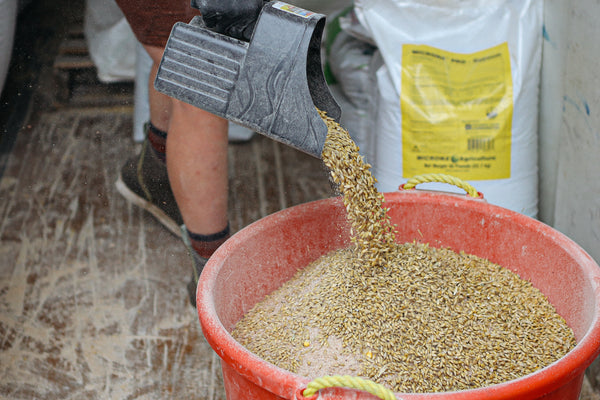Why Buying Organic Mushrooms Matters
There are a lot of reasons for people to buy organic produce. Some say it’s better for you, some say it ensures better quality, and some buy organic because supporting organic agriculture is better for the environment.
But buying organic is often more expensive, and sometimes organic produce spoils faster than conventional produce. Some areas may not have easy access to organic produce. So sometimes we buy conventional produce even when we would prefer to buy organic.
Buying organic mushrooms really matters though, and here are a few reasons why.
Organic Mushrooms Contain Fewer Pollutants
Typically, buying organic means that you’re buying produce that has been treated with fewer pesticides and artificial fertilizers (some pesticides and fertilizers are allowed by the National Organic Standard Board). While these substances have been deemed safe in the quantities used for conventional farming, there are concerns about repeated exposure to these chemicals.
For example, Roundup, a common herbicide, has been classified as a “probable human carcinogen,” and an insecticide called chlorpyrifos has been associated with developmental delays in infants. There’s also speculation that pesticide residue levels may contribute to the development of ADHD.
Residue of these pesticides exist on all conventionally grown produce, and washing can remove up to 80% of them. But mushrooms will take up carbon-based pollutants from the soil and use them as food, leaving the chemicals inside the mushroom. Some things that mushrooms (and other fungi) can take up from their environment include petroleum and petroleum products, polycyclic aromatic hydrocarbons (PAHs), polychlorinated biphenyls (PCBs), pentachlorophenols (PCPs), neurotoxins, airborne pollutants, heavy metals, like cadmium, lead, arsenic, mercury, and copper, dioxins, and other organophosphates. Plants only absorb a small amount of PCBs, for instance, so washing can help limit your exposure, but mushrooms take them up easily. PCP is a manufactured chemical that was once used as a pesticide, and is so dangerous that it is no longer used in agriculture.
These chemicals persist in the environment, and many are bioaccumulative, meaning that they are not easily eliminated from the body, so they build up over repeated exposures. Some are stored in fatty tissues and build up in this way.
Conventional mushrooms are grown with many of the same chemicals that conventional crops are. Fungicides are used to prevent mold from growing on substrate, and insecticides are used to kill the bugs that may lay eggs in the substrates. Conventional mushroom growers also use chemical disinfectants (like chlorine) to clean their mushroom sheds between crops.
Organic certification by the USDA requires inspectors to observe the growing media and environment, pest management practices, watering systems, and more. An inspector may also take samples of the soil or crop as needed. The land being used to produce organic food must also have not been contaminated with any prohibited substances for at least three years prior to certification. So this process really does help to control the number of pollutants entering the food supply.
Organic Mushrooms Might Be More Nutritious
Yes, there’s been a lot of research on organic produce versus conventional produce, and the bulk of that research has shown that nutritionally these two types of produce are very similar, if not the same. But there’s something important to consider about mushrooms:
The substrate.

Substrate is the medium that a mushroom grows in or on. Most edible mushrooms grow on a compost substrate or a wood-based substrate. Compost substrate mushrooms include such popular varieties as the white button mushroom, the cremini mushroom, and the portobello mushroom (guess what? These are all the same species of mushroom!), and more specialty mushrooms like the black truffle and the prized morel. Wood substrate mushrooms include shiitake mushrooms, oyster mushrooms, maitake mushrooms, and the medicinal reishi mushroom.
If you were to look at, for example, a compost substrate for growing agaricus mushrooms, the organic and conventional substrates might look very much the same. But conventional growers use fertilizers to add nitrogen to the substrate. This in itself isn’t a bad thing; nitrogen is an important macronutrient for mushroom growth.
But macronutrients aren’t the end of the nutrition story; micronutrients, like vitamins, minerals, and antioxidants are important too. The nutritional content of the mushroom depends at least in part on the nutritional content of the substrate, and since organic growers aren’t allowed to use certain nutrient amendments, they have to rely on a more complicated substrate. Some organic mushroom growers use a three phase process for producing their substrate that ensures that natural microbiotic action in the substrate produces a complex nutritional profile, resulting in more nutritious mushrooms!
Organic Mushrooms Are Better For The Planet
As with any organic produce, buying organic helps reduce the amount of chemical fertilizers and pesticides released into the environment. There’s this idea that commercial mushroom production doesn’t use pesticides, and that just isn’t true. Mushrooms, even when grown indoors, can become infested with both bugs and disease, and pesticides are used to prevent or treat these kinds of infestations. For example, a count by the USDA Pesticide Data Program found Thiabendazole (a pesticide) in 54.5% of domestic, conventionally grown mushroom samples (out of 635 samples), and zero from organic mushrooms.
Even when these pesticides and fertilizers aren’t thought to be harmful to humans, they often enter the air, soil, and water, resulting in dangers to the flora and fauna in the area. Many of them are dangerous to pollinating insects like bees that are vital for producing other crops.
Spent organic mushroom substrate is also great for composting and for fertilizing organic gardens and farms!
Buying organic mushrooms helps support organic producers, and increases the demand for organic produce, which encourages other producers to grow organic too! In this case, you’re definitely voting with your dollar.
These are just some reasons why buying organic mushrooms really matters! This is why Cascadia Mushrooms always offers organic fresh mushrooms, dried mushrooms, and mushroom growing kits. Show your love for people, plants, animals, and the planet by buying organic mushrooms!



